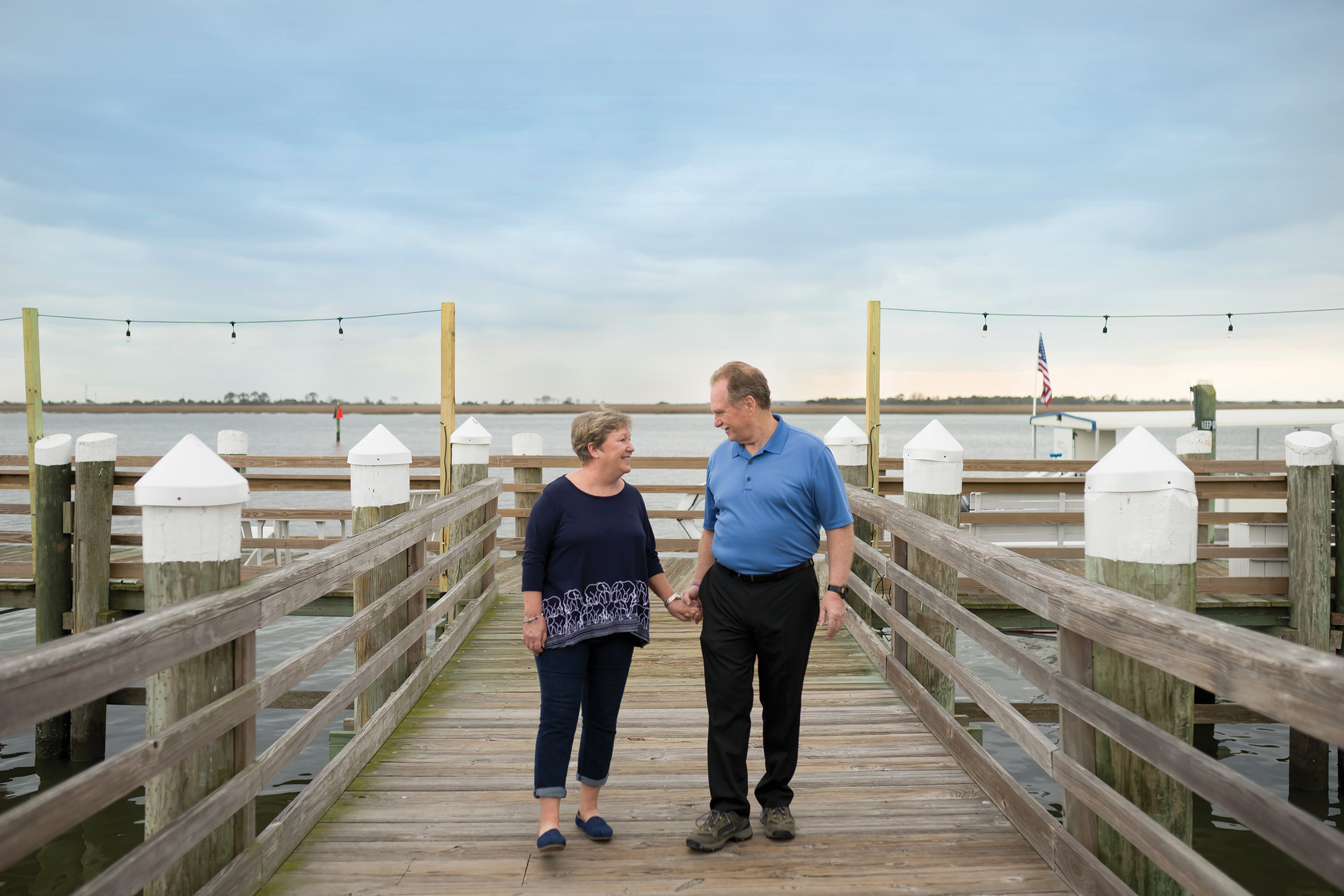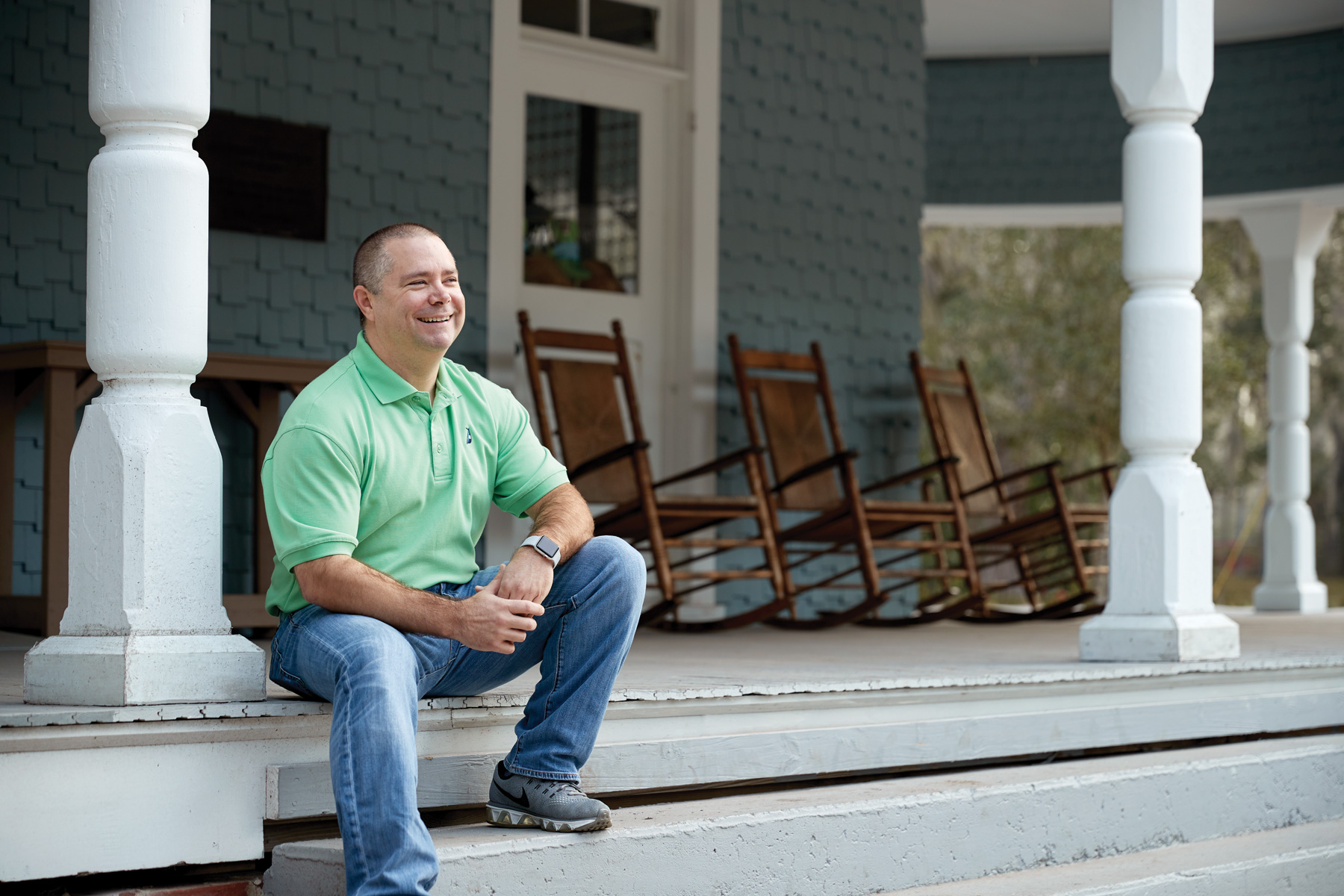How to Be a Member of the Jekyll Island Art Association
What'south it like living on a tiny barrier island that happens to be a country park? Old and new residents share their stories.
Jekyll Island is a small boondocks—some ane,000 people occupying a cozy five,700 acres. That's not to say anybody knows everyone, but there'southward an inherent neighborliness that comes from sharing such a small and special place. Whether they are permanent residents, part-fourth dimension snowbirds, or expats who have moved away, the people who accept called Jekyll home are connected to the land. And to each other.

Run into the Zerkuses
Instant connections
Maggie Zerkus had only ever dreamed of becoming a Jekyll Islander. she and her hubby, Chris, gradually fell in love with the golden isle as regular vacationers from metro Atlanta and other homes throughout the Georgia mainland, merely the idea of one day putting down roots in the barrier sand had always seemed out of accomplish.
That is, until August 2016, when a unit in the new shoreside Cottages on Jekyll Island development went up for sale, and the couple decided to have a chance. Maggie, a writer who works from domicile, had eagerly anticipated many aspects of being a full-fourth dimension Jekyll resident—the comfy climate, the peace and placidity of the 24-hour interval-to-day, and the ability to spring on her bike and breathe in the island's abundant natural dazzler. But non knowing a single i of her new neighbors, she didn't expect to exist initiated and then swiftly into a tight-knit customs. "Some of our neighbors who have been hither a long time were practically on our doorstep welcoming u.s.a.," she says.
Jekyll is home to and then many office-fourth dimension seasonal residents, plus a abiding stream of vacationers, that a person might go months or fifty-fifty years without encountering the owners of the house next door. But residents discover a common bail in coexisting with tourists—and alligators and turtles. Says Maggie, "Information technology's been an adjustment to live someplace where y'all become protective of the beach and the alligators and bobcats and the driftwood even. You become protective of the environment effectually you. You have the alligators and the wild animals here that are only as of import every bit the people. Most places they booty the alligator off. Here, you're told to alive with information technology. It's their habitation and you're living in their domicile."
When Hurricane Irma hit final September, residents helped board upwardly each other'due south windows and checked in on absent owners' damages when the winds had subsided. Facebook groups keep snowbirds and summertime vacationers in the loop, but for full-time residents like the Zerkuses, at that place are plenty of opportunities to social network the one-time-fashioned fashion. Maggie attends dinners and high tea at the Jekyll Island Club Resort's M Dining Room "to experience like function of the history of that building." Chris is a member of the Rotary Club, and they both go to church at Jekyll Presbyterian Community Church building. She is part of the Jekyll Isle Arts Association, the historical society, and the Cottages neighborhood association.
During the 24-hour interval, when she can't focus on her writing, Maggie can also just hop on her bike and explore the isle, bumping into neighbors along the way. "People here are happy to exist here," she says. "Then many people are in places because of their jobs. Nigh anybody is here because they've chosen to live here."

Come across the Culpeppers
Sticks and bricks
Wanda Culpepper is a retired teacher splitting her time between Athens and Jekyll—but her centre is always in the latter. She and her husband, John, ain a two-story brick home that was congenital in the 1950s as role of the structure boom of the early "state era," when the State of Georgia first opened the island to public development. Where in one case just wealthy barons of industry could beget to gunkhole to their mansions on Jekyll, the new causeway welcomed middle- and working-course families to erect more small ranches and bungalows—similar the Culpeppers' four-bedroom, tucked between the embankment and Jekyll Isle Golf Club. The state initially distributed lots via lottery; John's male parent came forth a little later and bought their house in 1966. Information technology has remained in the family always since.
Wanda remembers visiting the island at that fourth dimension, when everything was new and gleaming, from the (now "onetime") convention center with its pristine blueish pond pool to the shopping centers and restaurants. Only the modernization was not rampant. After all, Jekyll was now a country park, and the land mandated that development be held in residuum with the natural world—no more 1,675 developed acres (to 3,920 undeveloped acres), by statute. Residents don't technically own the land, just the "sticks and bricks" erected in and above the ground. "Nosotros have a ninety-nine-yr lease from the Jekyll Isle Authorization," says Wanda. "Nosotros won't accept to worry well-nigh it—our children can take care of that."
However, the Culpeppers and other residents must adhere to the guidelines of the Jekyll Isle Authority, a landlord of sorts. When the Culpeppers wanted to add together on to their house, they had to submit the plans, become the necessary permissions, and make three $150 payments to plant trees that would replace the 3 they felled in their expansion. "They are very detail about what goes on, but I think that's good," says Wanda. "This is our piece of heaven, and we want information technology to stay that fashion."

Come across the Harrisons
Living with history
Joey Harrison grew up on the island, raised by his grandmother and his grandfather, who was director of services and development for the Jekyll Island Authorization in the 1980s. The family lived in the Walter Furness Cottage, a stately Victorian built in 1890 for Furness, an architect and one of the founders of the Jekyll Island Society. The wood-framed edifice, once owned by newspaper magnate Joseph Pulitzer, served every bit the hospital for wealthy guests of the private hunting club. Across that historic link to some of the land'due south earliest blue-claret inhabitants, Joey is continued by his ain memories, forged in the freedom and confinement of the barrier island. "Information technology was amazing because at ten years old, I could only walk out of the firm at eight a.thousand., hop on my cycle, and be gone the entire 24-hour interval," he says. "There was no check-in. No feeling of insecurity. No crime, really. Everybody knew everybody."
At the time, he says, Jekyll was a tourist destination stuck in the 1950s, with development that lagged backside. But with no cable TV, no mall or arcades, he and his ring of friends rode bikes on clay trails, shot basketball at the Wanderer Cabin, played pickup football game or softball on the 4-H Center fields, or hit the water skis at the former Ski Rixen Pond—places that no longer exist equally they did thirty years ago but whose names are currency among longtime residents. Animal encounters were an unremarkable fact of life. "I literally shared infinite with gators and deer and never thought twice about information technology," he says. "I would fish a lot on the golf course lakes, and gators were everywhere. As long equally they were in the h2o I didn't worry much. If they were on country I just made sure to go along my distance."
Joey left for the mainland afterward loftier school, but he eventually returned to alive in nearby St. Simons with his own family. When they visit Jekyll, they now get to see the all-encompassing revitalization efforts of the last decade. Gone is the isolation from gild that one time, for better and for worse, defined the isle. Just even now, residents don't have to venture too far from the developed areas to lose themselves in the bottomless blackness of nighttime or come confront-to-face with deer and foxes and sea turtles.
Today, when they demand to escape, Joey and his children return to Jekyll, where he can share his boyhood memories and return to some of that solitude. "My kids are amazed past some of my experiences," he says. "They love Jekyll Island."
Source: https://www.jekyllisland.com/magazine/meet-the-locals/
0 Response to "How to Be a Member of the Jekyll Island Art Association"
Post a Comment